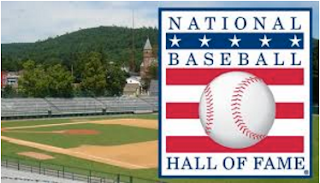New rules for baseball
The Electoral College is as American as baseball. And like baseball, the Electoral College system for electing the president often engenders the same frustrating sense of being a bystander in a game you're ostensibly playing: in the final inning of a game, for example, the pitcher could walk the bases full and then walk in a run or give up a home run. Even as a player on the field you are left with only the hollow, impotent rage of an onlooker, having had no part to play, having not even touched the ball.
Why does the similarity stop there?
 The popularity and continued use of the Electoral College should inspire those of us who love the game--as we love the Republic--to greater depths. If winner-take-all is indeed our national spirit, why must America's game cling to its outmoded scoring? Total number of runs over nine innings is clearly too simple-minded a way of determining a winner, and likely to stir up passions.
The popularity and continued use of the Electoral College should inspire those of us who love the game--as we love the Republic--to greater depths. If winner-take-all is indeed our national spirit, why must America's game cling to its outmoded scoring? Total number of runs over nine innings is clearly too simple-minded a way of determining a winner, and likely to stir up passions.Therefore, in order to address the unfair, un-American scoring discrepancy baseball presents, I would like to modestly propose a new set of plurality rules for scoring a baseball game:
- The team who scores the most runs in a particular inning will be awarded ALL of the runs scored in that inning by either team.
Then, (to continue the scenario) if in the following inning, 'B' scored 3 runs and 'A' none, the running score would be 'A'-5 vs. 'B'- 3, each having won an inning and been awarded all the points that inning carried.
I'm sure we can all agree that this makes much more sense.
Having awarded the points thusly, after 9 innings there could still be a tie, of course. In the new electoral plurality rules, the teams would play a 10th inning but to continue playing past that is pointless. If, at the end of the 10th inning, there is still a tie, the decision as to who has won the contest would be remanded to a responsible body, with knowledge of the teams, players and their capabilities.
There could be no better group than living members of the Baseball Hall of Fame to weigh, consider and decide which team should win, a college Baseball Elders. Like the electoral college, there could be some simple safeguards in place, such as a restriction on voting for a team on which an Elder had previously played.
What could be more American?
For a primer of past blog posts on the issues surrounding the Electoral College, click the links below: from the issues surrounding popular vote winners losing in the Electoral College, to Faithless Electors, to the democratic deficit inherent in the apportioning of EC votes.
Electoral College and the Popular Vote (19-July-2016)
Contested Convention and Faithless Electors (17-July-2016)
Alexander Hamilton & The First Contested Election (30-August-2016)
 James McCrone is the author of Faithless Elector, a suspense-thriller, that
James McCrone is the author of Faithless Elector, a suspense-thriller, that
Publishers Weekly calls a “fast-moving topical thriller.” Its “surprising twists add up to a highly suspenseful read.” The sequel, Dark Network, is coming soon.
Faithless Elector, by James McCrone is available through Amazon.
If you live in Philadelphia, pick up a copy at Head House Books -or- Penn Book Center
If you live in Philadelphia, pick up a copy at Head House Books -or- Penn Book Center


No comments:
Post a Comment